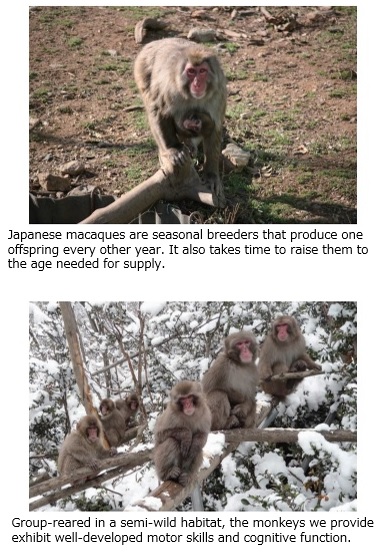

- Core Center:Kyoto University Primate Research Institute
- Principal Investigator:Katsuki Nakamura
- TEL:Center for the Evolutionary Origins of Human Behavior
- FAX:+81-568-65-0188
- Sub-Core Center 1:National Institute for Physiological Sciences, National Institutes of Natural Sciences
概要Overview
 The Japanese macaque is a species of macaque monkey that is closely related to humans. It is often used as an experimental animal model and is indispensable in various life science fields, including neurophysiology,infectious disease/immunology, and regenerative medicine. Japanese neuroscientists have produced crucial research findings on higher brain functions using Japanese macaques. Furthermore, Japanese macaques exhibit specific susceptibility and immune response to tropical and subtropical pathogens because they were isolated from the Eurasian continent several hundreds of thousands of years ago. Such characteristics are advantageous for comparative infectious disease studies.
The Japanese macaque is a species of macaque monkey that is closely related to humans. It is often used as an experimental animal model and is indispensable in various life science fields, including neurophysiology,infectious disease/immunology, and regenerative medicine. Japanese neuroscientists have produced crucial research findings on higher brain functions using Japanese macaques. Furthermore, Japanese macaques exhibit specific susceptibility and immune response to tropical and subtropical pathogens because they were isolated from the Eurasian continent several hundreds of thousands of years ago. Such characteristics are advantageous for comparative infectious disease studies.
Stock
・Japanese macaque: 1 line
Subjects in the NBRP programs “Genome information upgrading program” and “Fundamental technology upgrading program” related to “Japanese macaques”
【 Genome information upgrading program 】
| FY2010 | Genome sequence of Japanese macaques |
| FY2002-FY2003 | Genome Information Upgrading Program : FY2002-FY2006 |
【 Fundamental technology upgrading program 】
| FY2018-FY2019 | Development of a highly sensitive detection system for Japanese monkey B virus DNA (in Japanese) |

